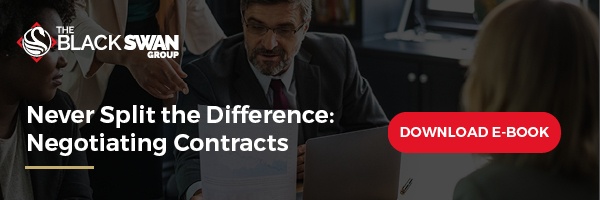Accusation Audits™ and Labels™ (more specifically, Asking Labels™) are two expert concepts that have evolved significantly since Never Split the Difference was published.
Read on to learn how we’re advising our best clients.
Expert Negotiator Concept No. 1: Accusation Audit
The Accusation Audit might be the most game-changing tool in the entire arsenal. Since Never Split the Difference was published, we’ve enhanced the words we use to apply it, and we now advise its use at three distinct times.
The enhanced words
We’ve gone from It seems like, It looks like, It sounds like, It feels like, and You seem, sound, look at the beginning to You’re probably thinking, You’re probably wondering, You may think, and some usage of This is probably ...
Here’s a boilerplate list to get your thinking started. Truth be told, you could undoubtedly use it in every one of your negotiations:
- You’re probably wondering why you agreed to take this call/meeting in the first place.
- You may be incredibly busy right now.
- This is probably the last thing you want to do.
- You might think this is a complete waste of your time.
- This may even seem unfair.
The three times you should use the Accusations Audit:
- At the beginning of your negotiation
- Just before giving bad news
- Just before your ask
DO NOT limit your Accusation Audit to the above five “starters” we have given you!
You KNOW what they are saying about you or your profession—either behind your back or when they are sitting around complaining about things at the end of the day over a few drinks.
Every single time someone has held back on Accusation Audits they felt were overkill, they got clobbered with exactly what they left out. There’s no kill like overkill.
Consider negative emotions vampire zombies. Stab them, cut their heads off, and set them on fire. Don’t let them come back to haunt you.
Derek Gaunt is an expert coach with The Black Swan Group and has had the most to do with the evolution of the Accusation Audit. Derek has probably coached more people to life-changing deals than anyone on our team.
Often a client comes to us with a negotiation they may have been struggling with for up to 18 months. Derek takes them to resolution in about 10 days—and usually less. The Accusation Audit is the principal tool for that acceleration; ignore it at your own peril.
Derek is also the author of Ego, Authority, Failure™, which is a best-selling book on applying the lessons of Tactical Empathy™ to leadership.
Expert Negotiator Concept No. 2: Asking Labels™
Adapt your Labels for use in place of questions. Please do this for both closed (confirmation yes) and open-ended questions (many of your Calibrated Questions™).
Closed-ended questions (confirmation yes) are verb-led (e.g., do, did, does, can, is), wherein you are generally trying to confirm that something is true (in a respectful manner) in order to proceed:
- Did you see something you liked? becomes It seems you saw something you liked?
- Can I help you? becomes It seems like I can help you?
- “Is it possible? becomes It seems like it’s a possibility?
Anything at all that you can do to get out of the “yes addiction” will serve you well. Being the hostage of yes is the 1st Deadly Sin of Negotiation™.
Asking Labels in place of open-ended questions and Calibrated Questions™
As you know, The Black Swan Method™ replaces open-ended questions with what we have defined as Calibrated Questions. These take the standard list of open-ended questions (e.g., the who, what, when, where, how, and why questions) and cut it down to just what, how, and the surgical use of why.
Now, reformat the open-ended question into an Asking Label.
- What do you think? becomes It seems like you’re thinking about something?
- What do you think? could also be It seems like you’re thinking about this?
More examples as food for thought:
| Calibrated Question |
Asking Label |
| What did you have in mind? |
Seems like you’ve got something in mind? |
| What’s the main challenge here? |
Seems like there is one, single looming challenge? |
| What are you up against? |
Seems like there is something you’re up against? |
| What’s your single most binding constraint? |
Seems like there is one specific thing most holding you back? |
| How do you want to proceed? |
Sounds like you’ve got some ideas on how to proceed? |
| What’s the next step? |
Seems like you’ve got a feel for what has to happen next? |
Don’t forget tone of voice: Use an upward, inquiring inflection
Keep in mind that Asking Labels are delivered with an upward inflection at the end. Your tone of voice should be one that conveys genuine curiosity and genuine inquiry.
This is encouraging and nonthreatening, and it lands on your counterpart gently.
A great tone of voice is the subtle application of negotiation mastery.
Make it rain!


